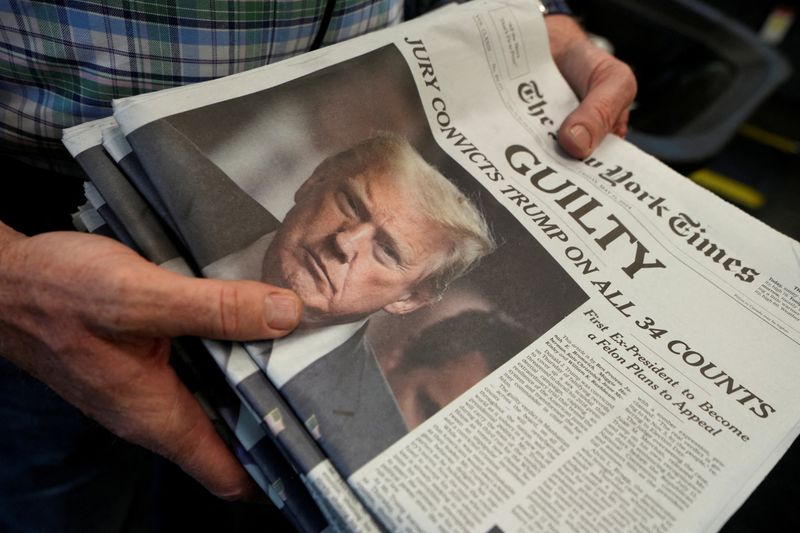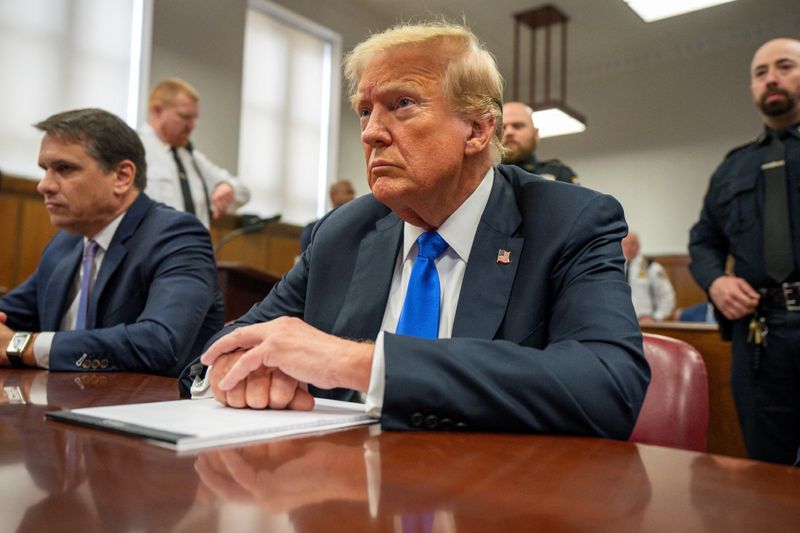By Jack Queen
(Reuters) -Donald Trump, the first former U.S. president to be convicted of a crime, will remain a free man while he awaits sentencing and could avoid a prison term entirely for falsifying business records to cover up a hush money payment to a porn star.
Here is a look at what’s next for the Republican candidate for president against Democratic President Joe Biden in a Nov. 5 election.
WHAT HAPPENS NOW?
The judge presiding over the case, Juan Merchan, must first approve the verdict and enter a final judgment, though this is typically a formality.
Merchan set sentencing for July 11, just days before the Republican Party is scheduled to formally nominate Trump for president ahead of the Nov. 5 election.
The crime of falsifying business documents carries a maximum sentence of four years in prison, though those convicted often receive shorter sentences, fines or probation. Incarceration would not legally prevent Trump from campaigning, or taking office if he were to win.
Lawyers and prosecutors will recommend sentences and then argue over them at Trump’s sentencing hearing, where Merchan will make a decision.
WILL TRUMP GO TO PRISON?
That is unlikely.
The maximum sentence for Trump’s crime of falsifying business records is 1-1/3 to four years in prison.
It is rare for people with no criminal history who are convicted only of falsification of business records to be sentenced to prison in New York. Punishments like fines or probation are more common.
Defendants convicted of falsifying business records who get sentenced to time behind bars typically serve a year or less, and even in those cases most were convicted of other crimes such as fraud or grand larceny - unlike Trump
If punished beyond a fine, Trump could be placed under home confinement or subject to a curfew rather than imprisoned.
As a former president, he has a lifetime Secret Service detail, and the logistics of keeping him safe behind bars could be complicated.
Trump could also be released on bail while appealing his conviction.
CAN TRUMP APPEAL THE CONVICTION?
Yes. Trump is likely to make arguments that Merchan rejected ahead of trial, including that the indictment is legally flawed and politically motivated.
He is also likely to argue Merchan deprived him of a fair trial by making legal errors, including allowing salacious testimony by a porn star who said she had sex with Trump - testimony his lawyers said was gratuitous and aimed at inflaming the jury against him.
The defense is likely to argue that the charges themselves were legally improper. Falsifying business records on its own is a misdemeanor in New York, but is elevated to a felony when done to help commit or conceal another crime. In this case, Bragg's office said that other crime was a conspiracy to violate a state election law.
But Trump's lawyers have argued that state law does not apply to federal elections.
COULD TRUMP STILL BE PRESIDENT?

Yes. The U.S. Constitution only requires that presidents be at least 35 years old and natural-born U.S. citizens who have lived in the country for 14 years.
In theory, Trump could be sworn in from jail or prison on Inauguration Day, Jan. 20, 2025, if he were to unseat Biden.
